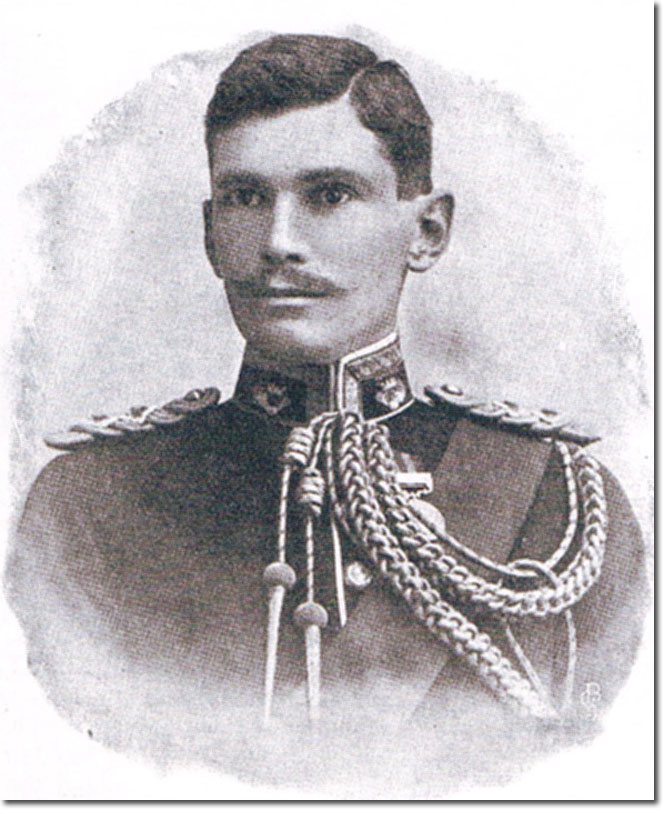|
|


|
|
Major Vallentin was killed in the Boer War on 4 Jan 1902. His medals were sold at auction by Spink in a special Anglo-Boer War anniversary sale in Oct 1999. They included a medal for Burma 1885-7 and Queen's and King's South Africa medals with clasps for Cape Colony, Elandslaagte, Defence of Ladysmith, Orange Free State, Johannesburg and Diamond Hill. The catalogue has an account of his service in South Africa and his death. He was John Maximilian Vallentin, born in 1865, son of Sir James Vallentin, Knight Sheriff of London. He was also the uncle of John Franks Vallentin VC who was killed in WW1.
He was one of the most enigmatic and impressive young officers who fought in the Boer War. A veteran of Ladysmith and a man who had been mentioned in despatches four times. His untimely death robbed Kitchener of one of his most promising officers. Vallentin had pursued the guerilla war with an unusual zealousness and been particularly notable for the way in which he had employed the surrendered burghers, 'National Scouts', under his command. He was appointed District Commissioner of Heidelberg and suffered from enteric fever for a while. After his recovery he set about clearing Boer Commandos from his district. He raised a unit called Vallentin's Heidelberg Volunteers made up of former Boers. He had lived with the Boers for a week in the autumn of 1900 when he was sent out with a proclamation by Lord Roberts. On 24 May 1901 the VHV captured a laager and brought in 9 prisoners and much stock. Vallentin was wounded in the firefight. On 24 July a party of scouts fell into an ambush where four were killed. Guide Gorman was mentioned in despatches on this occasion for remaining behind with Major Vallentin to cover the retirement of four dismounted men of the Burgher Corps who would have been shot had they fallen into enemy hands. The action that ended with the death of John Vallentin occurred in Jan 1902. He commanded a mixed force which included 110 men of the 5th Queensland Imperial Bushmen under Major F Toll. On 4th Jan a small party of Boers lured them towards a kloof where they were ambushed by 300 of the enemy. Vallentin withdrew his men to make a stand on the ridge at Onverwacht. He ordered the withdrawal of the column's pom-pom, but the burghers worked around the flanks, shot the horses and the gun ended up in a donga. Vallentin was forced to make a last stand on a small ridge which was virtually bereft of cover. The enemy, under Kommandant Opperman pressed their attack home with vigour, under the impression that they were avenging Bethal. Again and again they threw themselves at the small force on the hill and were forced back. Two burghers fell within 10 metres of the defenders. Vallentin strived to the last to avert defeat and rally his force, but when the Boers worked their way round the back of his position and began firing at 50 metres range he knew that they stood no chance. John Maximilian Vallentin stood exposed to the enemy fire, issuing instructions when he was shot down.
Lieut-Col Sir Thomas Montgomery-Cuninghame described him in Dusty Measure, a Record of Troubled Times 'All this intelligence work brought me in touch with the District Commissioner, Major Vallentin, then with the Command of the fighting troops. Vallentin, who belonged to the Somerset Regiment, was a man of amazing energy and resource. Not conciliatory by nature, but always cheerful when least accommodating, he loved a fight of any kind and was always ready for adventure. He had been one of the so-called "twelve apostles" who had been sent out by the War Office before the war to report on the state of affairs. He had very advanced views, not only on modern methods of fighting but also on the reorganisation of society. He was, in fact, a Crusader. Strangely impersonal in his aims, and therefore bound either to make his mark in troubled times, or to be removed as a nuisance by careerists in peace time, he was eager to take advantage of any opportunity for distinction. In his effort to find it he was finally shot in an obscure scuffle on the high veldt when serving with the Australian contingent. I mourned him sincerely, for I admired him much. I think he would have come into his own in the World War, and it is sad to think that we lost so good a soldier in such a useless way.' |
Armed Forces | Art and Culture | Articles | Biographies | Colonies | Discussion | Glossary | Home | Library | Links | Map Room | Sources and Media | Science and Technology | Search | Student Zone | Timelines | TV & Film | Wargames